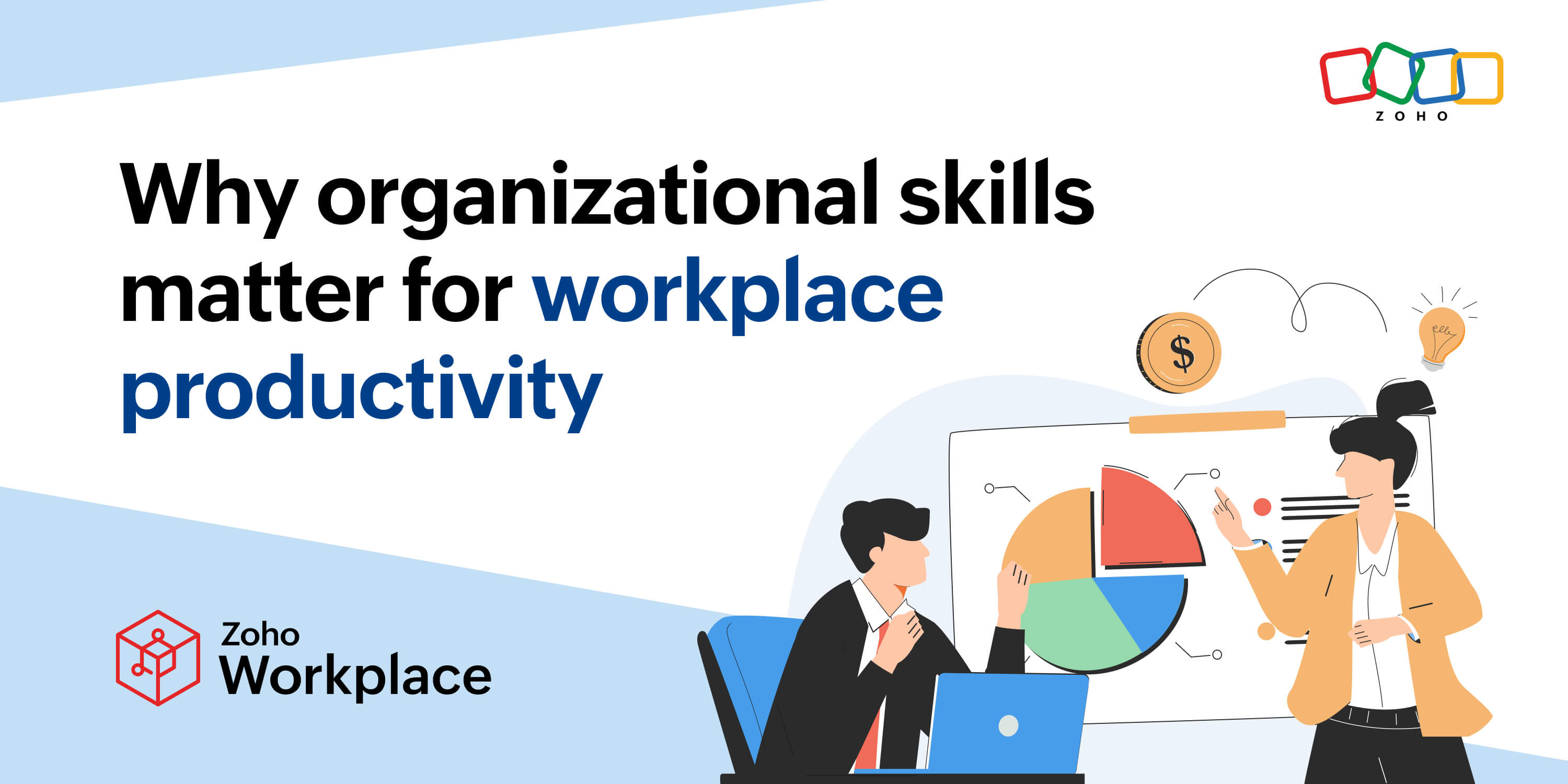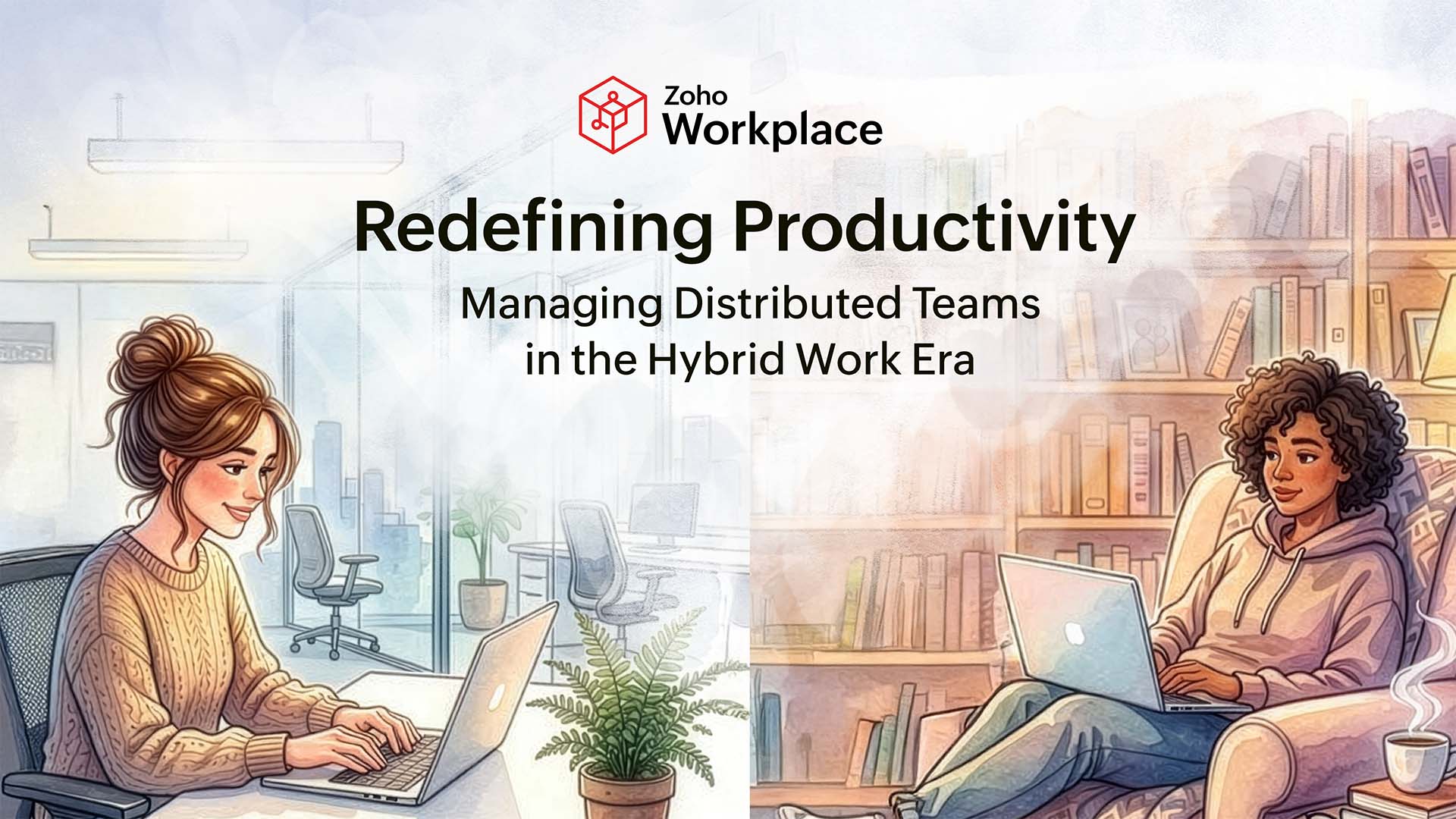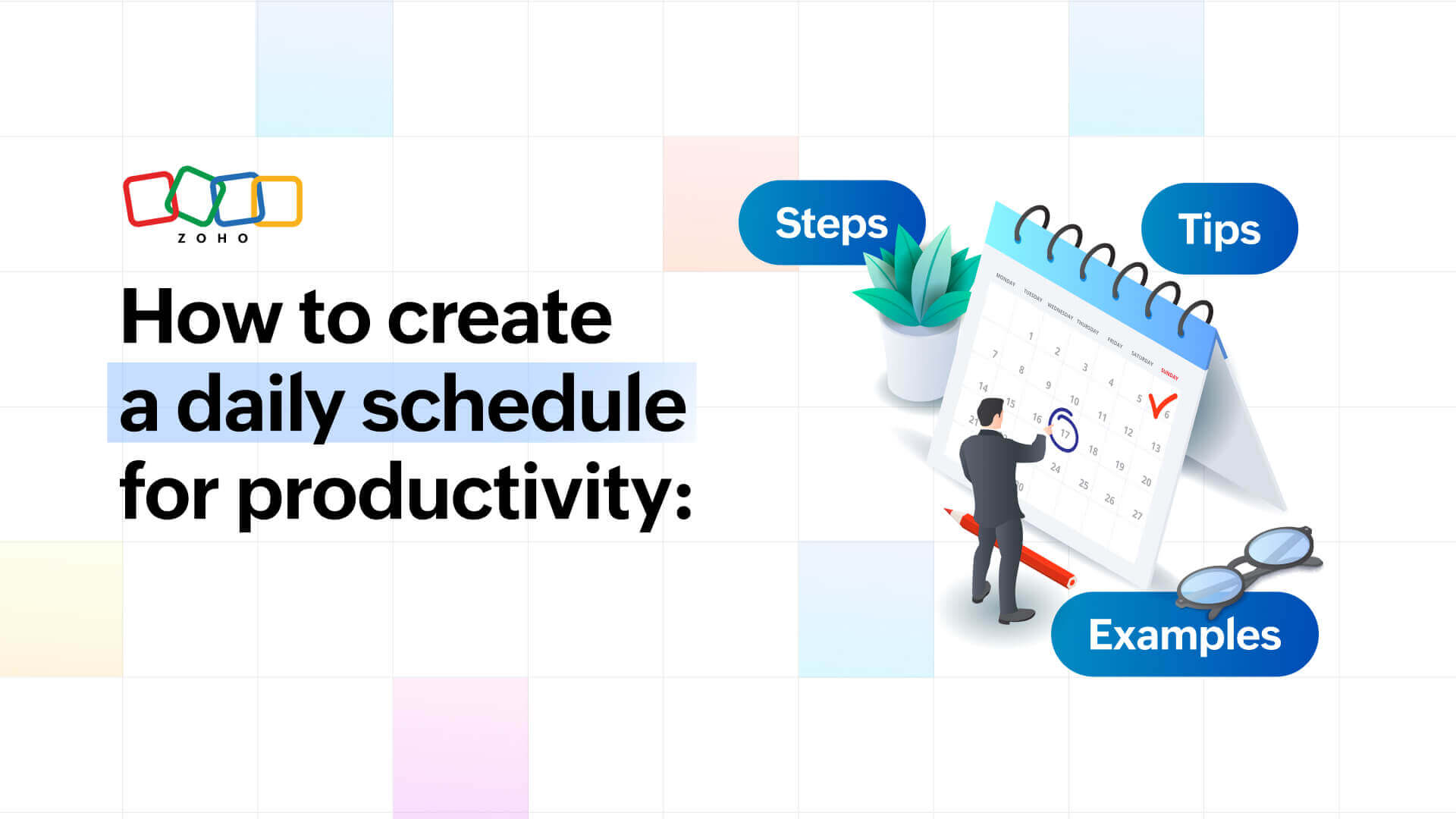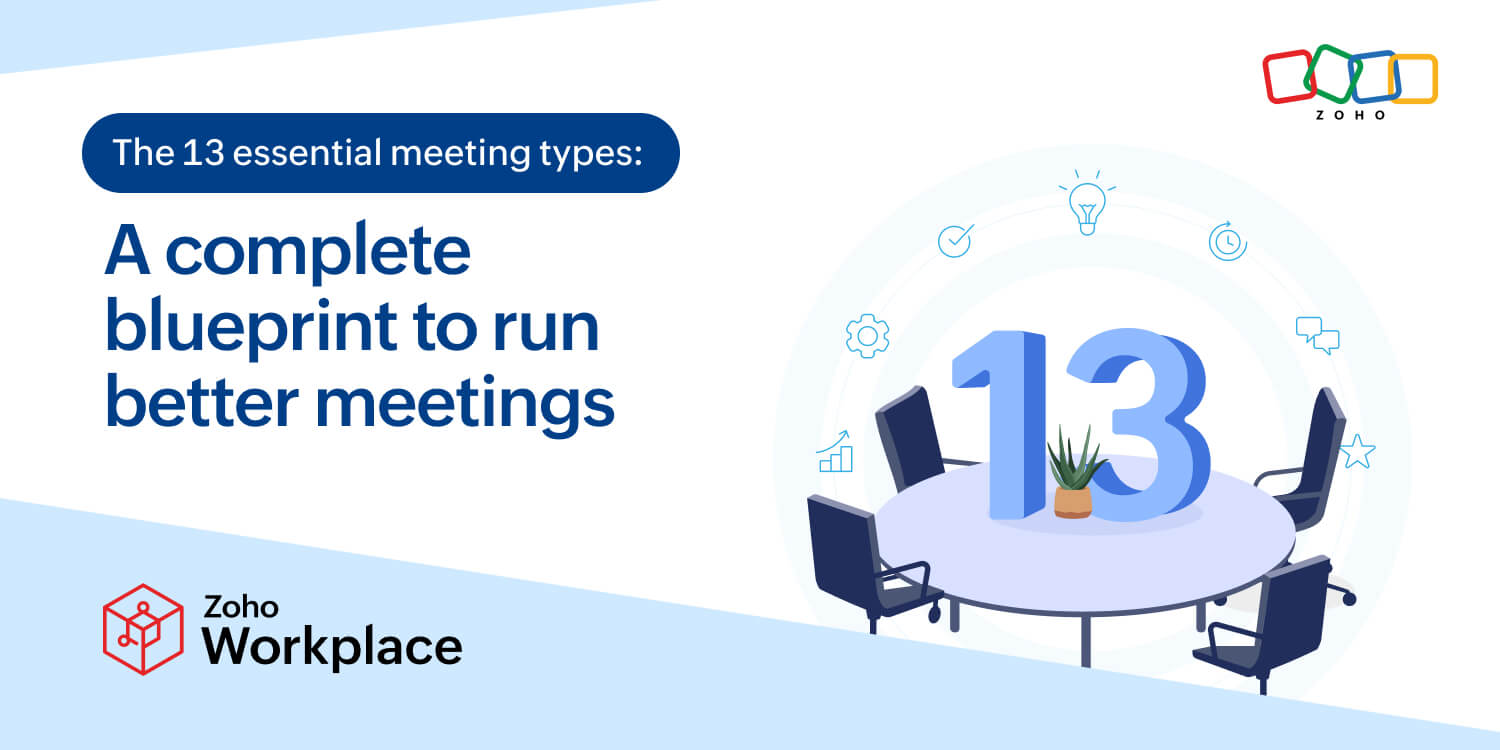- HOME
- All Topics
- Productivity in the workplace
- Why organizational skills matter for workplace productivity
Why organizational skills matter for workplace productivity
- Published : August 22, 2025
- Last Updated : August 22, 2025
- 1.7K Views
- 14 Min Read
Meet Alex, a talented marketing associate with great ideas and energy. But there’s one thing he hasn’t quite mastered yet: organizational skills.
It starts small. He forgets to label his folders properly—so every campaign file ends up in a folder called “Final_Final_Updated.” His calendar is more of a suggestion than a schedule, and sticky notes have become his primary project management tool.
Then Monday hits.
An important client request comes in, but where did that last email go? A key deadline is approaching, but which of the three versions of the report is the final one? By Wednesday, he’s missed a deadline, double-booked a client call, and accidentally sent last quarter’s report to the leadership team. The disorder isn’t just affecting him—it’s slowing down the team, confusing clients, and making his ideas harder to execute.
The result isn't a lack of effort; it's a lack of organization.
Disorganization doesn’t mean someone isn’t capable—it means their potential is getting lost in the clutter. So, how do you escape this cycle? You don't need a degree in library science. You just need to implement a few, simple systems.
Organizational skills can be learned, practiced, and supported with the right tools. This article will show how being organized is key to turning great ideas into greater results without the panic.

What are organizational skills?
Organizational skills are the abilities that allow you to use your resources—like time, energy, and mental focus—effectively and efficiently to get things done.
Whether it’s managing your daily tasks, structuring your calendar, or simply remembering where you saved that file named “final_final_v2_revised", organizational skills are the system that helps you manage everything in a structured way.
Hard vs. soft organizational skills
Not all organizational skills look the same. Some are tools, others are habits.
Hard organizational skills are the concrete, tool-based abilities you can learn and use. These are the skills you might list on a resume. Examples include using a project management app like Zoho ToDo or Asana, mastering a digital calendar, or creating a logical filing system on your computer. These are the "how-to" skills.
Soft organizational skills are the everyday behaviors and mindsets that quietly power your productivity. They’re not about which tools you use—they’re about how consistently you use them.
Think of them as your internal operating system:
- Punctuality that gets you to meetings on time (without the dramatic sprint).
- Reliability that helps you meet deadlines.
- Tidiness that keeps your workspace neat.
These traits aren’t flashy, but they’re essential. They’re what turn good intentions into actual results.
Because let’s be honest: You can download the best project management app on the market, color-code every task, and set ten reminders—but if you don’t have the discipline to check it, it’s just a very stylish icon gathering dust on your home screen.
Soft skills are what make your hard skills work. They’re the quiet force behind your ability to stay organized, focused, and dependable—day after day.
Type | Example | Description |
Hard Skills | Using a task management app | Knowing how to structure tasks, set reminders, and track progress |
Soft Skills | Being habitually punctual | Showing up prepared, respecting others’ time, and staying consistent |
Related skills that work together
Organizational skills don’t work alone. They're the foundation for several other key professional skills.
Time management
When you have a clear picture of your tasks, you can schedule your time effectively and avoid the frantic last-minute rush. It's the difference between "I'll get to it eventually" and "This is on my calendar for Tuesday at 2 PM."
Prioritization
Good organizational skills give you the clarity to figure out what needs attention now vs. what can wait (hint: not everything is “urgent”). It prevents you from spending all day on low-priority work while a major deadline looms.
Attention to detail
Staying organized helps you catch the small stuff that keeps the big stuff from falling apart. When your information is structured, you're less likely to miss a typo, an important footnote, or a key requirement.
Why do organizational skills matter?
Organizational skills are key to professional success. They're not just about being neat; they're about being efficient, reliable, and less stressed.
When you're organized, you know where to find information, what your priorities are, and how to allocate your time. This means you spend less time searching for misplaced documents and more time on high-impact work.
The path to career growth and leadership
Organization skills allow you to manage multiple projects, contribute effectively to your team, and, eventually, lead.
- Career growth: Promotions often come with more responsibility and a bigger workload. Organizational skills are what enable you to handle this increased complexity without getting overwhelmed. They allow you to plan your time strategically and delegate tasks, showing you're ready for the next level.
- Team contribution: A disorganized team member can become a bottleneck. By being organized, you ensure that you're a positive contributor, not a source of delays. You quickly share information, meet your deadlines, and help the team stay on track.
- Leadership: Great leaders are great organizers. They're able to see the big picture, set clear goals, and establish processes that help their team succeed. They don't just manage people; they manage the flow of work, resources, and information.
Benefits of strong organizational skills
Developing strong organizational skills isn't just about making your desk look good for a photo op; it's about fundamentally improving your professional life.
Increased productivity
When everything has its place — including your priorities — you spend less time searching and more time doing. Your workflow is streamlined, and you can easily transition from one task to the next.
Example: Alex uses a task management app to plan his week. Instead of juggling sticky notes and mental reminders, he checks his dashboard each morning and knocks out high-priority tasks first. Result? He finishes projects ahead of schedule and still has time for brainstorming new ideas.
Better time management
Organized people don’t have more hours in the day—they just use them better. Scheduling, prioritizing, and planning help you make time for what truly matters (yes, including coffee breaks).
Example: Alex blocks his calendar for deep work, meetings, and even lunch breaks. By batching similar tasks and avoiding multitasking, he gets more done in less time—and doesn’t end up eating dinner at his desk.
Improved focus and clarity
A cluttered workspace and to-do list leads to a cluttered mind. When you're organized, you map out a clear plan, and you can focus on one task at a time without worrying about all the others. This laser focus not only helps you produce higher quality work but also makes the process more enjoyable.
Example: Alex starts each day by reviewing his work items for the day and clearing his workspace. With distractions minimized and his priorities set, he can dive into complex reports without losing momentum...or sanity.
Better work-life balance
When you're organized at work, you're more likely to finish your tasks on time. This means less work spilling into your evenings and weekends, freeing you up to enjoy your personal life.
Example: Alex wraps up his day by reviewing what’s done and what can wait. Because he’s organized, he rarely works late—getting his evenings back for yoga, Netflix, or pretending he’s going to watch that TED talk.
A stronger reputation at work
Spoiler alert: Organized professionals often become go-to leaders.
After all, the person who consistently delivers on time, stays composed under pressure, and keeps things running smoothly is the person everyone wants on their team.
How organizational skills improve productivity
Think of a disorganized workday as a car stuck in traffic—a lot of activity but not a lot of progress. Organizational skills are your personal GPS, helping you cut through the noise, focus on high-impact tasks, and avoid spending your day rearranging your to-do list.
1. Ability to prioritize high-impact tasks
Without a system, it's easy to get lost in a sea of small, urgent, but ultimately low-value tasks. Strong organizational skills help you:
Separate the urgent from the important. By categorizing your tasks, you can distinguish between what needs to be done now and what is truly important for your long-term goals.
Create a clear plan. Not every “ASAP” email deserves your morning. When your tasks are prioritized, you can create a focused plan for your day. You're not just reacting to incoming requests; you're proactively working through a list that is aligned with your objectives.
Build momentum. Let’s be honest, there’s something deeply satisfying about knowing your top priorities and watching them fall into place like a well-played game of Tetris. This momentum can carry you through the rest of your to-do list, making you more efficient and motivated.
2. Avoid duplication or wasted time
Few things slow down progress like doing the same task twice or spending 20 minutes searching for a file you swore you saved “somewhere safe.”
Organizational skills help you avoid those time traps by keeping your work structured, accessible, and intentional. When you're organized, you can:
Prevent starting from scratch. Without a solid filing system or a clear process, you might find yourself searching for a document you already created or re-doing work you've already completed.
Organizational skills ensure that your work is easily accessible and reusable, so you're not constantly starting from scratch.
Eliminate redundant efforts. When your tasks and projects are clearly documented, you avoid the professional faux pas of having two people working on the same thing. This not only saves time but also prevents awkward conversations and ensures your team is working cohesively.
Streamline workflow. Organizational skills create a clear and repeatable process for your work. This means less time spent figuring out "what to do next" and more time spent actually doing it.
3. Manage interruptions and multitask effectively
In today’s workplace, interruptions are practically part of the job description. Emails, pings, impromptu meetings, and the occasional “Got a minute?” all compete for your attention. Organizational skills provide you with the tools to handle these challenges without losing your focus. They help you:
Establish a system for interruption. Instead of letting every pop-up email or message immediately pull you away from your work, organizational skills allow you to create a plan for handling them.
For example, you can schedule specific times to check and respond to emails, using your other time for focused work.
Multitask with purpose. The myth of effective multitasking is that you can do several things at once. The reality is that you’re just switching your attention rapidly, which is inefficient. Being organized allows you to single-task with intention.
When you have a clear plan, you can dedicate a block of time to one task, finish it, and then move on to the next.
Create a holding area for new ideas. When an interruption or a new idea comes up while you're focused on a task, you can use an organized system (like a quick note or a designated app) and "park" it for later. This allows you to acknowledge the new item without breaking your current concentration.
Organizational skills in the workplace
From entry-level positions to the C-suite, strong organizational skills are non-negotiable. For new employees, they build a foundation of reliability and accountability. For seasoned professionals, they enable effective leadership and strategic thinking.
1. Organization in teamwork and collaboration
In a well-functioning team, organizational skills are the silent MVP. They don’t always get the spotlight, but they’re the reason meetings start on time, deadlines are met, and no one’s frantically searching for “that one doc we shared last Tuesday… or was it Thursday?”.
Strong organizational skills help teams to:
Improve communication and clarity. When team members are organized, information is clear and accessible. They know where to find the latest version of a document, who’s responsible for which task, and when key milestones are due.
This reduces the need for constant, clarifying questions and prevents miscommunication.
Enhance accountability. A well-organized team establishes clear roles, responsibilities, and deadlines. This clarity creates a culture of accountability where each member understands their part in the project's success.
It's much harder to miss a deadline or shirk a responsibility when the entire team is operating from a single, organized plan.
Manage resources efficiently. Team projects often involve shared resources, whether it's a budget, specific software, or even just meeting time. Organizational skills ensure these resources are managed efficiently.
Meetings have clear agendas, and time is used to make decisions, not to catch up on what was missed.
2. Organization for managers and leaders
For managers and leaders, organizational skills aren’t just a personal asset; they're a core professional competency. You're not just organizing your own work, but also guiding and structuring the efforts of your entire team.
Only an organized team can provide the clarity and direction needed for success. Strong organizational skills help leaders to:
Delegate with precision. A good leader doesn't just hand off tasks; they strategically assign them based on team members' skills, workloads, and development goals. This requires a clear understanding of the project's various components and a systematic way of tracking who’s responsible for what.
Track team progress. Organizational skills enable leaders to establish a system for tracking team progress without resorting to constant micromanagement. This may involve using project management software, setting up regular check-ins, or creating a shared dashboard.
When a manager has a clear, organized view of the team's progress, they can quickly identify roadblocks, provide support, and keep the project moving forward.
Meet deadlines with confidence. Great leaders don’t just manage people—they manage momentum. By breaking down large projects into bite-sized, actionable tasks and pairing them with realistic timelines, they transform complexity into clarity.
This proactive approach prevents the last-minute scramble and stress that come from a lack of planning. An organized leader manages the workflow, not just the people, ensuring that deadlines are met consistently and with a high level of quality.
3. Organization for the hybrid and remote workplace
When you're not in the same physical space as your colleagues and managers, your ability to stay on top of your work becomes a critical measure of your professionalism. In this environment, you're not just organizing tasks; you're organizing your entire digital and professional life to ensure you remain productive and connected.
Here's how being organized helps hybrid and remote teams:
Stay self-managed and accountable. In a remote setting, organizational skills help you set clear start and end times, schedule breaks, and structure your day to stay focused.
With a to-do list, a digital calendar, or a project management app, you can create a reliable system to prioritize your tasks, deadlines, and track accomplishments.
Master digital organization. Instead of letting your inbox become a monument to unread messages, you can use folders and labels, and set up a system for filtering and archiving to stay on top of your communications.
Use consistent naming conventions and a logical folder structure for shared drives, cloud storage, and local files to make it easy for you and your colleagues to find what's needed.
4. Organization in hiring
When it comes to hiring, recruiters aren’t just scanning for degrees and buzzwords—they’re hunting for signs of someone who can actually get things done. While you may not see "master of to-do lists" as a required qualification, recruiters are looking for clues about your organizational abilities throughout the hiring process.
Recruiters look for tangible evidence of your organization skills:
On your resume and cover letter. A well-organized resume is the first sign of an organized professional. Is the formatting clean and consistent? Are the dates and job titles clearly presented? Are the bullet points concise and easy to read?
A messy resume signals a potentially messy approach to work. A well-structured one, however, suggests a person who pays attention to detail and takes pride in their work.
In your interview responses. When asked about your work experience, do you provide clear, structured examples? Can you walk the interviewer through a project you managed, explaining the steps you took and how you kept things on track?
Your ability to articulate a process and the results you achieved is a direct reflection of your organizational skills.
In your behavioral examples. Recruiters often use behavioral questions like, "Tell me about a time you had to manage multiple priorities." An organized candidate will have a clear, step-by-step response.
They’ll explain how they prioritized the tasks, broke down the project, and managed their time to meet the deadline. A disorganized candidate, on the other hand, may offer a vague response, suggesting they handle things "as they come."
In your professional presence. Even the little things can signal your organizational habits. Was the email you sent to schedule the interview free of typos? Did you arrive on time (or a few minutes early)?
These are all small but powerful indicators that you’re someone who plans ahead and respects deadlines—a key trait of an organized professional.
How to improve your organizational skills
Improving your organizational skills isn’t about becoming a productivity robot or alphabetizing your snack drawer (respect if you do). It’s about building habits and systems that help you work smarter, stay focused, and actually finish what you start—without the last-minute scramble. Here are a few ways to improve your organizational skills.
1. Self-audit your work
Before you can sharpen your organizational skills, you need to identify the areas where the clutter lives. This is your chance to be brutally honest with yourself and pinpoint the specific areas of your life and work that are disorganized.
- Email inbox: Is it streamlined or messy?
- Task management: Do you have a system—or just sticky notes and good intentions?
- Calendar use: Are you scheduling with purpose or playing appointment roulette?
- File organization: Can you find what you need in under 30 seconds?
- Daily workflow: Are you reacting to everything or planning ahead?
If any of these made you wince, congratulations—you’ve found your starting point.
2. Try digital tools to organize your workflow
Whether you're juggling meetings, managing projects, or just trying to keep your inbox under control, the right tools will help you smooth things out.
Task apps
- Use them to: Capture to-dos, set deadlines, and track progress.
- Popular picks: Todoist, Zoho To Do, Notion.
- Pro tip: Don’t just list tasks; categorize them by priority or project.
Digital calendars
- Use it to: Allocate focused time for deep work, admin tasks, or even breaks.
- Popular picks: Zoho Calendar, Calendly, Fantastical.
- Pro tip: Grant view-only access for visibility, or full access for co-planning.
Note taking apps
- Use them to: Map out your day, jot quick notes, or sketch ideas.
- Popular picks: Zoho Notebook, Evernote, Google Keep.
- Pro tip: Customize covers for visual cues and faster navigation.
A real-time example of strong organizational skills in action
Organizational skills aren't just theoretical; they’re put to the test every day in the real world.
The project manager who aced the product launch
Remember Alex? He’s come a long way since we last met him. He is now a project manager tasked with coordinating a high-stakes product launch. Multiple teams. Tight deadlines. A marketing campaign, a feature rollout, and a client webinar—all scheduled within the same week. And he made it look effortless.
Alex started by:
- Creating a detailed launch roadmap with clear milestones.
- Assigning tasks across teams with realistic timelines and dependencies.
- Setting up shared dashboards so everyone can track progress without daily status meetings (because no one needs another meeting that could’ve been a comment).
He scheduled:
- Weekly check-ins that were short, focused, and actually useful.
- Automated reminders for key deliverables.
- A single source of truth for assets, updates, and approvals—no more “Where’s the final version?” scavenger hunts.
When a last-minute bug threatened the release, Alex didn’t panic. He:
- Reprioritized tasks on the fly.
- Communicated the impact clearly to stakeholders.
- Shifted the launch window by 24 hours—without derailing the campaign or the team’s sanity.
The outcome? The product launched smoothly. The teams stayed in sync. Alex earned a reputation not just as a great project manager, but as the person who could coordinate success.
How Zoho Workplace helps you master organization in the workplace
Zoho Workplace brings together everything you need to communicate, collaborate, and create in one seamless ecosystem.
- It gives you a single dashboard to access all your tools: Mail, Cliq, WorkDrive, Writer, Sheet, Show, and more.
- With Streams, smart filters, and reminders, Zoho Mail helps you tidy up your inbox.
- With Zoho Calendar and Zoho ToDo, you can plan your day, set reminders, and block time for deep work.
- By creating shared folders for each department or project, Zoho WorkDrive organizes your file management.
Final thoughts: Being organized is a workplace superpower
Being organized isn't about having a perfectly clean desk or a color-coded calendar; it's about giving yourself a significant professional advantage. A lack of organization skills is a silent tax on your career. It costs you time, energy, and opportunities.
The great news is that no one is born with perfect organizational skills. They’re a muscle you can train. You can build these habits.
The trick is to start small and be consistent. Don't try to overhaul your entire life in a day. Start by:
- Creating a simple to-do list each morning.
- Cleaning off your desk for 5 minutes at the end of the day.
- Using a calendar to block out time for your most important tasks.
These small habits will compound over time, turning a messy, stressful workday into a more structured, productive, and enjoyable one.
 Prashanth
PrashanthPrashanth is a Senior Product Marketer in the Zoho Workplace team who focuses more on Workplace productivity and how teams can work better. He loves bringing a creative element to his work. He enjoys traveling, writing, reading, and playing badminton.


